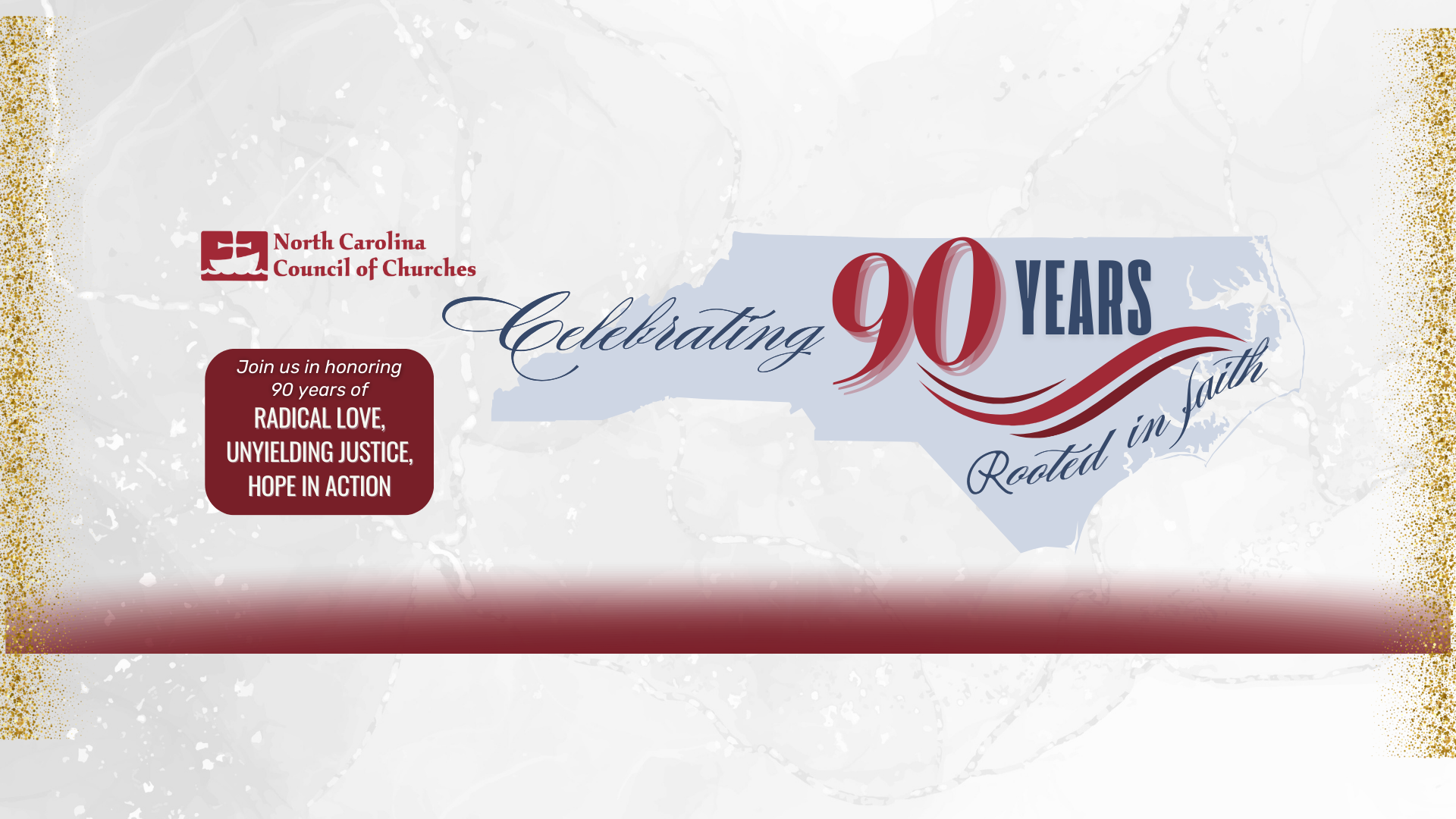As we celebrate 90 years of faithful work for justice and equity this year, we’re sharing stories of 90 Years Rooted in Faith that reflect the heart of the North Carolina Council of Churches. Each month, you’ll hear from staff and long-time friends of the Council as they highlight the transformative impacts we’ve had on our community and our vision for the future. Stay tuned for these inspiring reflections throughout the year!
The Rev. Nelson Johnson was a relentless, effective advocate for civil rights and equal justice. His death on February 9, 2025, in his home city of Greensboro, got me to thinking about my single in-person encounter with him – and, as the memories spun out, about a special aspect of my involvement with the North Carolina Council of Churches.
The occasion was the 2016 version of what the Council called its Critical Issues Seminar. The event, held every two years, was essentially a conference intended to focus on an issue of overriding importance to North Carolina’s civic well-being and to inform and energize the organization’s network of churches and congregants.
That year’s Seminar, held at St. Matthew United Methodist Church in Greensboro, confronted one of our most vexing social challenges: “Race, Power, and Privilege.” As was customary, it featured segments for all attendees as well as a series of workshops in which aspects of the larger issue were examined.
Johnson was the moderator for a plenary session that helped frame the day-long event. It featured a discussion between two Duke University faculty members – one the director of Black Church Studies at the Divinity School and the other a cultural historian focused on race and religion.
No one could doubt Johnson’s credentials in that moderator role. His career was spent at the cutting edge of the struggle for Black equality. The galvanizing moment came in 1979, when a worker’s rights and anti-white supremacy demonstration that he spearheaded was attacked by Ku Klux Klan members and their allies. When the shooting stopped, four marchers lay dead and another’s injuries would prove fatal.
It became Johnson’s quest to hold the assailants and alleged police collaborators accountable – an effort that took many years, in the face of obstinacy by Greensboro officials. In the meantime, he launched his career in ministry, eventually helping to found and direct the Beloved Community Center. His credibility as an advocate for racial justice was forged along that hard path.
At the 2016 Critical Issues Seminar, Nelson Johnson wasn’t alone in the spotlight. Attendees could choose among 13 workshops covering the challenge of “Race, Power, and Privilege” in its many aspects. Among the presenters were UNC Law Professor Gene Nichol, drawing on his deep research into the link between poverty and race discrimination, and Anita Earls, now a justice of the state Supreme Court, who highlighted Black citizens’ stake in efforts to secure voting rights and end gerrymandering. Workshop topics drawn from a schedule that I pulled from my archives convey the breadth of the day’s discussions:
- Poverty and Affluence
- Educational Achievement
- Housing
- Health Care
- Civil Rights and the N.C. Council of Churches
- The Legislative Response
- Immigration
- Law Enforcement and Houses of Faith
- Pressures on Voting Rights
- Environmental Justice
- Racial Patterns and Worshipping Communities
- Faith-Rooted Organizing
- The Progressive Christian Response
Organizing an event of this magnitude takes a lot of work, and I was privileged to be fully involved in this one and others, under the leadership of now-retired Executive Director George Reed; his successor, Jennifer Copeland; and former Deputy Executive Director Aleta Payne. Over my years as a staff volunteer, following my retirement from the news business in 2012, not only were there several Critical Issues Seminars but, on an alternate two-year schedule, companion Legislative Seminars drilling down on topics facing the General Assembly.
It was rewarding to see some of the state’s most knowledgeable and respected figures join these events as speakers and presenters. For example, former UNC System President Tom Ross was the keynoter at the 2019 Legislative Seminar, focusing on the harm caused by gerrymandering and on the importance of redistricting reform.
Former state Supreme Court Justice Robert Orr led a workshop at the same event examining worrisome partisan influences on the state’s judiciary.
At the 2017 Legislative Seminar, Allison Riggs, then senior staff attorney for the Durham-based Southern Coalition for Social Justice and now waging a legal battle to retain her seat on the Supreme Court, took the lead in reviewing legislative efforts to skew elections via voter suppression.
The Council’s annual policy-oriented events not only served to educate. They also were motivators and morale-boosters for folks working to counter forces of greed and unfairness that sometimes could seem insurmountable. Those efforts have been central to the Council’s mission throughout its 90 years.
Sustaining enthusiasm for the causes of social justice, in line with Christian teachings, among the Council’s affiliates and even into the pulpits and pews remains high among its goals. I was proud to have a hand in those efforts – and in a small way to be in partnership with justice champions such as Nelson Johnson.
Join us in continuing this legacy of justice and courage. Your gift supports the Council’s work for equity and compassion across North Carolina. Donate today.
As we celebrate our 90th Anniversary, we reflect on the incredible journey of the North Carolina Council of Churches. For nearly a century, we've fought for justice, championing causes like Medicaid expansion, voting rights, environmental action, and more. Thanks to partners like you, we've made a real impact.


